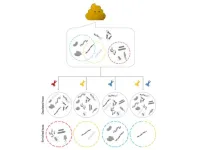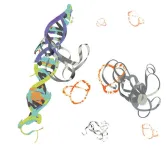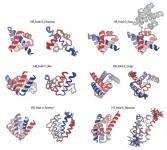(Press-News.org) New study reveals striking similarities in synaptic abnormalities and behavioral patterns between male and female mouse models of autism spectrum disorder (ASD). The study challenges the traditional focus on male subjects in ASD research and highlights the critical importance of including both sexes in investigations. This finding urges a pivotal shift in the scientific community's approach to understanding and addressing ASD, emphasizing the necessity of considering both males and females to comprehensively grasp the complexities of the disorder.
Autism spectrum disorder (ASD) research has predominantly focused on male individuals, reflecting a prevalence rate of 4:1 compared to females. However, recent studies suggest a potential underestimation of ASD in females. In a new study led by Prof. Haitham Amal, School of Pharmacy-Faculty of Medicine at the Hebrew University of Jerusalem, the sex-specific synaptic and behavioral differences in ASD mouse models were investigated, revealing significant insights into the condition.
A new study, featured in Scientific Reports, looked at young male and female mice with specific mutations linked to autism, comparing them to regular mice. They used two different mouse models with two human-based mutations. The goal was to understand how their brain connections work by checking certain proteins in their brains. They also checked how many tiny structures in brain cells were present using a special staining method (Golgi).
The results showed that both male and female mice with these mutations had a lot in common. They all showed major drops in Spine Density and in levels of GAD1, NR1, VGAT, and Syp (neuronal signaling proteins) compared to normal mice. This suggests their brain connections didn't develop properly. Interestingly, these issues in brain connections were similar in both male and female mice, and it matched up with how they behaved in tests that measure sociability. They also found that the social behvaior deificts were similar in both sexes.
Prof. Haitham Amal, Hebrew University emphasized the significance of these discoveries: "Our study underscores the need to consider both sexes in ASD investigations. The observed similarities in synaptic alterations between male and female ASD mice challenge the traditional focus on males, urging the scientific community to broaden its approach and include females in ASD studies."
These discoveries hold significant implications for understanding ASD's neurodevelopmental aspects. They emphasize how synaptic and behavioral changes in both male and female ASD mice align, stressing the need to study females alongside males in ASD research. This study urges a fundamental change in ASD research, highlighting the importance of considering both sexes to fully grasp and address the complexities of autism spectrum disorder.
It signifies a vital progression in unraveling ASD complexities, marking a substantial milestone in understanding the condition beyond the typical male-focused approach.
Globally, substantial funding is dedicated to autism research, with estimates reaching billions of dollars annually. However, historically, a significant proportion of this funding has been predominantly directed towards studying autism in boys, reflecting the higher prevalence in males. Studies suggest that a considerable imbalance exists in research allocation, with significantly fewer resources dedicated specifically to understanding and addressing autism in girls. Efforts to bridge this gap and allocate more resources towards understanding the unique manifestations and needs of girls on the autism spectrum must be recognized as crucial in advancing comprehensive autism research and support.
END
Gender parity in autism research: Synaptic similarities challenge focus on male models
2024-01-04
ELSE PRESS RELEASES FROM THIS DATE:
Tiredness experienced by Long-COVID patients has a physical cause
2024-01-04
Researchers from Amsterdam UMC and Vrije Universiteit Amsterdam (VU) have discovered that the persistent fatigue in patients with long-COVID has a biological cause, namely mitochondria in muscle cells that produce less energy than in healthy patients. The results of the study were published today in Nature Communications.
"We're seeing clear changes in the muscles in these patients," says Michèle van Vugt, Professor of Internal Medicine at Amsterdam UMC.
25 long-COVID patients and 21 healthy ...
New roles for autophagy genes in cellular waste management and aging
2024-01-04
Autophagy, which declines with age, may hold more mysteries than researchers previously suspected. In the January 4th issue of Nature Aging, it was noted that scientists from the Buck Institute, Sanford Burnham Prebys and Rutgers University have uncovered possible novel functions for various autophagy genes, which may control different forms of disposal including misfolded proteins—and ultimately affect aging.
“While this is very basic research, this work is a reminder that it is critical for us to understand whether we have the whole story about the different genes that have been related to aging or age-related diseases,” said Professor ...
The surprisingly resourceful ways bacteria thrive in the human gut
2024-01-04
The gut microbiome is so useful to human digestion and health that it is often called an extra digestive organ. This vast collection of bacteria and other microorganisms in the intestine helps us break down foods and produce nutrients or other metabolites that impact human health in a myriad of ways. New research from the University of Chicago shows that some groups of these microbial helpers are amazingly resourceful too, with a large repertoire of genes that help them generate energy for themselves and potentially influence human health as well.
The paper, published January 4, 2024, in Nature ...
Genomic ‘tweezer’ ushers in a new era of precision in microbiome research
2024-01-04
In a landmark study recently published in the journal Nature Methods, researchers at the Icahn School of Medicine at Mount Sinai have unveiled mEnrich-seq—an innovative method designed to substantially enhance the specificity and efficiency of research into microbiomes, the complex communities of microorganisms that inhabit the human body.
Unlocking the Microbial World with mEnrich-seq
Microbiomes play a crucial role in human health. An imbalance or a decrease in the variety of microbes in our bodies can lead to an increased risk of several diseases. However, in many microbiome applications, the focus is on studying specific ...
Scientists tame chaotic protein fueling 75% of cancers
2024-01-04
Meet MYC, the shapeless protein responsible for making the majority of human cancer cases worse. UC Riverside researchers have found a way to rein it in, offering hope for a new era of treatments.
In healthy cells, MYC helps guide the process of transcription, in which genetic information is converted from DNA into RNA and, eventually, into proteins. “Normally, MYC’s activity is strictly controlled. In cancer cells, it becomes hyper active, and is not regulated properly,” said UCR associate professor of chemistry Min Xue.
“MYC is less like food for cancer cells and more like a steroid ...
Breakthrough in designing complicated all-α protein structures
2024-01-04
A team of researchers has developed an innovative method to design complicated all-α proteins, characterized by their non-uniformly arranged α-helices as seen in hemoglobin. Employing their novel approach, the team successfully created five unique all-α protein structures, each distinguished by their complicated arrangements of α-helices. This capability holds immense potential in designing functional proteins.
This research has been published in the journal Nature Structural and Molecular Biology on January 4, 2024.
Proteins fold into unique three-dimensional structures based on their amino acid sequences, which then dictate their ...
Scientists solve mystery of how predatory bacteria recognizes prey
2024-01-04
A decades-old mystery of how natural antimicrobial predatory bacteria are able to recognize and kill other bacteria may have been solved, according to new research.
In a study published today (4th January) in Nature Microbiology, researchers from the University of Birmingham and the University of Nottingham have discovered how natural antimicrobial predatory bacteria, called Bdellovibrio bacterivorous, produce fibre-like proteins on their surface to ensnare prey.
This discovery may enable scientists to use these predators to target and kill ...
Scientists engineer plant microbiome for the first time to protect crops against disease
2024-01-04
Breakthrough could dramatically cut the use of pesticides and unlock other opportunities to bolster plant health
Scientists have engineered the microbiome of plants for the first time, boosting the prevalence of ‘good’ bacteria that protect the plant from disease.
The findings published in Nature Communications by researchers from the University of Southampton, China and Austria, could substantially reduce the need for environmentally destructive pesticides.
There is growing public awareness about the significance of our microbiome – the myriad of microorganisms that live in and around our bodies, most notably in our guts. Our gut ...
Chiba University is pleased to announce the International Conference: “Humanities In The Age Of Space Exploration”
2024-01-04
Introduction to the Event: As the world witnesses rapid technological advancements and the increasing reality of space travel and habitation, Chiba University is taking the lead in shaping the dialogue on the future of space development and humanity. The upcoming conference will feature distinguished speakers from Chiba University and international institutions, converging to facilitate interdisciplinary discussions. Through diverse lenses encompassing philosophy, ethics, law, political science, and horticulture, the conference aims to gain profound insights, welcoming active ...
US study offers a different explanation why only 36% of psychology studies replicate
2024-01-04
In light of an estimated replication rate of only 36% out of 100 replication attempts conducted by the Open Science Collaboration in 2015 (OSC2015), many believe that experimental psychology suffers from a severe replicability problem.
In their own study, recently published in the open-access peer-reviewed scientific journal Social Psychological Bulletin, Drs Brent M. Wilson and John T. Wixted at the University of California San Diego (USA) suggest that what has since been referred to as a “replication crisis” might not be as bad as it seems.
“No one asks a critical question,” the scientists argue, “if ...




